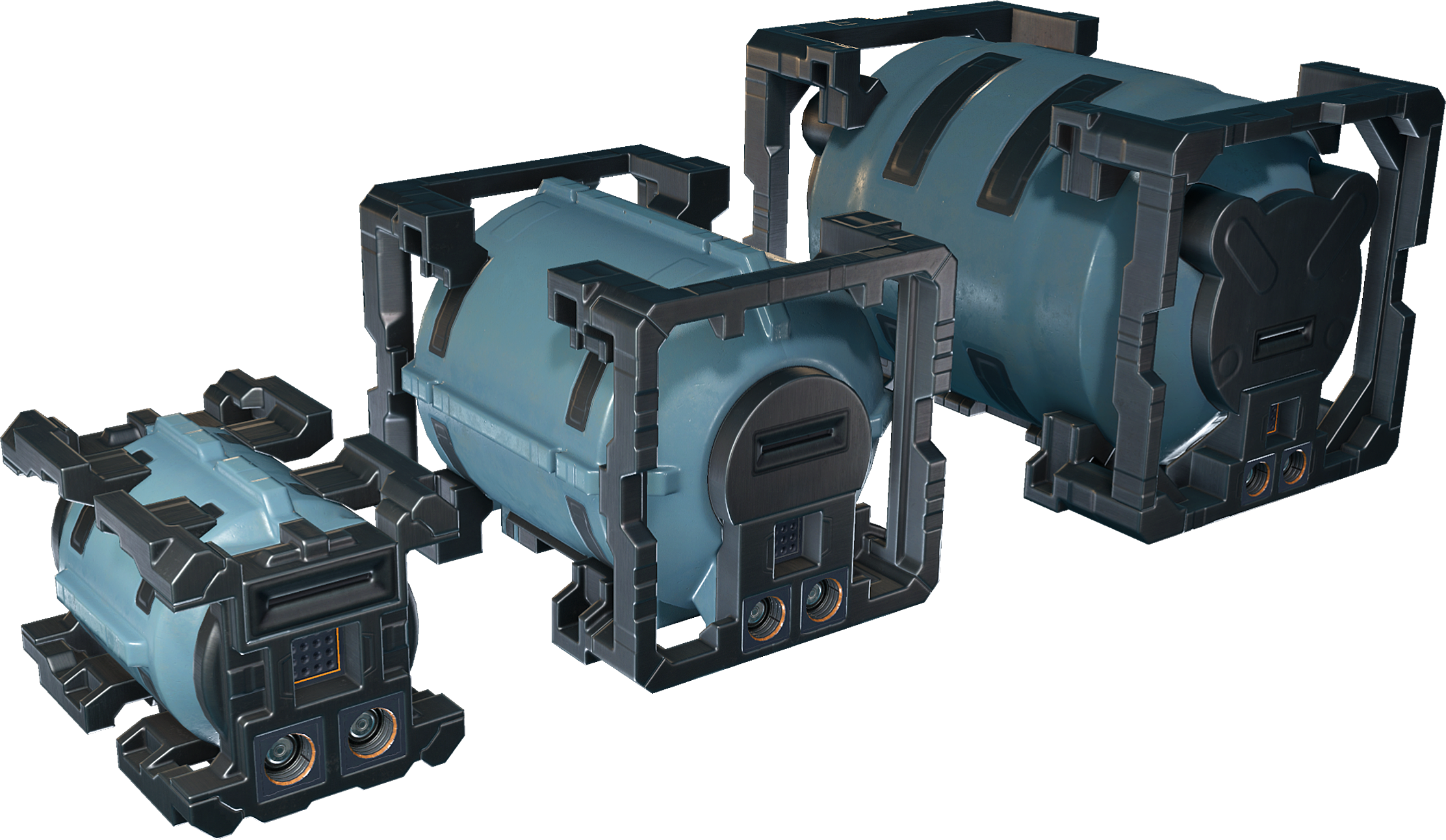Difference between revisions of "Propellant tank"
m |
|||
| Line 5: | Line 5: | ||
|ru=Ракетное топливо | |ru=Ракетное топливо | ||
|ua=Ракетне Паливо | |ua=Ракетне Паливо | ||
}} | }}{{SB Infobox Begin | ||
== | |{{SB Infobox Header | ||
|image=[[Image:Starbase_large_gas_container.png]] | |||
|factionLogo= | |||
[[ | |caption= | ||
< | |name=Propellant Tanks | ||
< | |border=none | ||
}} | |||
|{{SB Infobox Device General Information | |||
|type=Thruster machinery | |||
|function=Stores thruster propellant | |||
|availability=[[Luxury Items]] | |||
|size=<ul><li>96×96×144 cm ''(small)''</li><li>144×144×192 cm ''(medium)''</li><li>192×192×288 cm ''(large)''</li></ul> | |||
|mass=<ul><li>4,569 kg ''(small)''</li><li>10,984 kg ''(medium)''</li><li>24,413 kg ''(large)''</li></ul> | |||
|volume=<ul><li>466 kv ''(small)''</li><li>1,125 kv ''(medium)''</li><li>2,502 kv ''(large)''</li></ul> | |||
|corrosionResistance=475 | |||
|suppressUnitsKg=1 | |||
|suppressUnitsKv=1 | |||
}} | |||
|{{SB Infobox Device IO | |||
|electricIn= | |||
|electricOut= | |||
|energyCapacity= | |||
|coolantIn= | |||
|coolantOut= | |||
|coolantCapacity= | |||
|coolantRefresh= | |||
|heatGeneration= | |||
|heatDissipation | |||
|propellantIn=50,000 per second | |||
|propellantOut=50,000 per second | |||
|propellantCapacity=<ul><li>1,500,000 ''(small)''</li><li>5,000,000 ''(medium)''</li><li>12,000,000 ''(large)''</li></ul> | |||
|fuelIn= | |||
|fuelOut= | |||
|fuelCapacity= | |||
|sockets= | |||
|YOLOLchips= | |||
|modInterfaces= | |||
|deviceInterfaces= | |||
}} | |||
|{{SB Infobox Device Construction | |||
|headerOverride=Composition (tank) | |||
|aegisium=90% | |||
|ajatite= | |||
|arkanium= | |||
|bastium=10% | |||
|charodium= | |||
|corazium= | |||
|exorium= | |||
|haderite= | |||
|ice= | |||
|ilmatrium= | |||
|karnite= | |||
|kutonium= | |||
|lukium= | |||
|merkerium= | |||
|nhurgite= | |||
|oninum= | |||
|surtrite= | |||
|tengium= | |||
|ukonium= | |||
|valkite= | |||
|vokarium= | |||
|xhalium= | |||
}} | |||
|{{SB Infobox Device Construction | |||
|headerOverride=Composition (supports) | |||
|aegisium=20% | |||
|ajatite=5% | |||
|arkanium= | |||
|bastium=70% | |||
|charodium= | |||
|corazium= | |||
|exorium= | |||
|haderite= | |||
|ice= | |||
|ilmatrium= | |||
|karnite= | |||
|kutonium= | |||
|lukium= | |||
|merkerium= | |||
|nhurgite= | |||
|oninum= | |||
|surtrite= | |||
|tengium= | |||
|ukonium= | |||
|valkite= | |||
|vokarium=5% | |||
|xhalium= | |||
}} | |||
}}<section begin=summary/> | |||
Propellant tanks are the vessels used to store [[Propellant|propellant]], which [[Thrusters|thrusters]] use to produce force. They come in a variety of sizes, and are constructed of the propellant tank and two structural supports, which also provide socket access to the propellant tank itself. These support pieces also have one modular device interface per piece, and the propellant tank can also convey other resources if the tank is placed in-line with a [[Pipe networks|pipe network]].<section end=summary/> | |||
== Basic information == | == Basic information == | ||
| Line 26: | Line 111: | ||
== Device fields == | == Device fields == | ||
=== Propellant tank support === | === Propellant tank support === | ||
{|class="wikitable" | {|class="wikitable" | ||
| Line 71: | Line 149: | ||
|- | |- | ||
|} | |} | ||
To learn more about how to use the device fields, consult these wiki pages: | |||
* [[Universal tool|Universal Tool]] | |||
* [[Data networks|Data networks]] | |||
* [[YOLOL|YOLOL]] | |||
[[Category:Devices and machines|Propellant]] | [[Category:Devices and machines|Propellant]] | ||
Revision as of 08:05, 27 May 2021
- 96×96×144 cm (small)
- 144×144×192 cm (medium)
- 192×192×288 cm (large)
- 4,569 kg (small)
- 10,984 kg (medium)
- 24,413 kg (large)
- 466 kv (small)
- 1,125 kv (medium)
- 2,502 kv (large)
- 1,500,000 (small)
- 5,000,000 (medium)
- 12,000,000 (large)
Propellant tanks are the vessels used to store propellant, which thrusters use to produce force. They come in a variety of sizes, and are constructed of the propellant tank and two structural supports, which also provide socket access to the propellant tank itself. These support pieces also have one modular device interface per piece, and the propellant tank can also convey other resources if the tank is placed in-line with a pipe network.
Basic information
Propellant tanks do not usually require regular maintenance.
They are placed in a ship with either one or two support pieces, connected to the ship's thrusters with a pipe tool, and replaced when empty or refueled at a station.
The small, medium and large tanks hold 1.5, 5, and 12 million units of propellant respectively.
Full propellant tanks cost 48000, 160000, and 378000 credits respectively in Spaceship Designer.
Propellant tanks with propellant inside explode when damaged.
Device fields
Propellant tank support
| YOLOL field | description | range |
|---|---|---|
| IsOpenId | Input/output field for closing/opening connectors. | 0 - 1 |
| FlowId | Output field for resource amounts flowing through the network. | |
| GasNetworkStoredResource | Amount of propellant currently available in all conected containers. | 0 - GasNetworkMaxResource |
| GasNetworkMaxResource | Maximum amount of propellant that can be stored in all conected containers. |
Propellant tank
| YOLOL field | description | range |
|---|---|---|
| GasContainerStoredResource | Amount of propellant currently available in this container. | 0 - GasContainerMaxResource |
| GasContainerMaxResource | Maximum amount of propellant that can be stored in this container. |
To learn more about how to use the device fields, consult these wiki pages:
